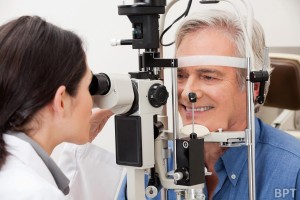Eye-opening facts about aging eyes and vision problems
 (BPT) – Most Americans know that vision problems begin to increase as they age. What they may not realize is that reduced vision is also linked to a higher frequency of falls, injuries and depression. Eye disorders such as cataracts, glaucoma and age-related macular degeneration can rob seniors of their independence.
(BPT) – Most Americans know that vision problems begin to increase as they age. What they may not realize is that reduced vision is also linked to a higher frequency of falls, injuries and depression. Eye disorders such as cataracts, glaucoma and age-related macular degeneration can rob seniors of their independence.
Here are some facts and tips for maintaining eye health and vision while aging gracefully:
Many people can avoid vision loss as they age
Losing sight as you age should not be considered an inevitability. In fact, the World Health Organization states that 80 percent of blindness is preventable if the disease or condition causing it is diagnosed and treated in time.
Although many people find that they need reading glasses as they get older, according to the Centers for Disease Control and Prevention, one in six seniors has a vision impairment that cannot be corrected with glasses or contact lenses. This may be caused by common eye conditions and diseases, including:
* Cataract, a clouding of the eye’s lens.
* Glaucoma, a disease which can rob the eye of its peripheral vision.
* Age-related macular degeneration, the deterioration of the central vision that is responsible for the ability to see fine details clearly.
With proper preventive care and timely treatment, many seniors can avoid permanent vision loss due to these diseases.
Eye exams are key to healthy vision
Many eye diseases and conditions have few or no noticeable symptoms until vision has already been lost, so it’s important to keep up with regular exams.
By age 40, a person should have obtained a baseline comprehensive medical eye exam and by age 65, eye exams should be scheduled every one to two years, or as recommended by an ophthalmologist – a medical doctor who specializes in the diagnosis, medical and surgical treatment of all eye diseases and conditions.
Finding an ophthalmologist can be easy
There are approximately 30,000 ophthalmologists across the United States.
For seniors concerned about the cost of seeing an ophthalmologist, EyeCare America, a national public service program of the Foundation for the American Academy of Ophthalmology, is available to ensure seniors have access to eye care they need.
The program matches eligible seniors who haven’t seen an ophthalmologist in three or more years with one of more than 6,000 volunteer ophthalmologists who provide them with a comprehensive eye exam and care, often at no out-of-pocket cost for up to one year. To see if you, your friends or family members are eligible, visit www.eyecareamerica.org.
A healthy body also benefits your eyes
Here are a few tips to help care for your eyes between exams:
* Eat well. Ensure you include citrus fruits, vegetable oils, nuts, whole grains, dark green leafy vegetables and cold water fish in your diet.
* Exercise regularly. Not only does it help your heart, waistline and energy levels, but 30 minutes of physical exercise a day will also benefit your eyes.
* Wear sunglasses. Sunglasses protect the eyes from cataracts and even eye lid cancers, so make sure you wear them, especially during the summer, when at the beach or in the water, when participating in winter sports, and when taking medications that increase your sensitivity to light.
* Don’t smoke. Smoking increases your risk of cataracts and age-related macular degeneration, as well as risks for cardiovascular diseases that indirectly influence the health of your eyes.
“Keeping your eyes in good health is incredibly important, and the first step is to get an eye exam,” says Dr. Charles P. Wilkinson, an ophthalmologist and chair of EyeCare America. “Most people take vision for granted until they notice changes-too late to avoid vision loss. Maintaining your eye health can help you keep your independence.”
EyeCare America is co-sponsored by the Knights Templar Eye Foundation with additional support from Alcon.